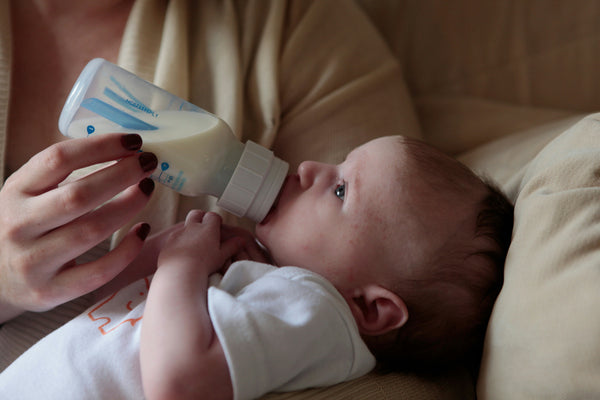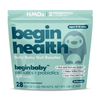How to Prevent Constipation During Baby-Led Weaning
share this article

Baby-led weaning is an exciting (and messy!) time for your little one to experience new textures and develop important skills. But as their diet changes, so can their digestion, sometimes leading to constipation.
If your baby is suddenly struggling to go or their poops are harder than usual, you aren’t alone! Starting solids is one of the most common reasons for childhood constipation and if pooping becomes painful, it can lead to withholding and more chronic issues [1].
Thankfully, small tweaks to your baby’s diet and routine can get things moving smoothly.
Why Do Babies Get Constipated When Starting Solids
Every baby is different, but here are a few common reasons why their digestion might slow down:
-
New Food = New Gut Bacteria. Any big diet change (even for adults!) shifts gut bacteria, which can affect digestion. It might take your little one’s gut some time to adjust to all the changes.
-
Low Fiber Intake. Fiber helps keep poop soft and easy to pass, so if your kiddo isn’t eating enough fiber-rich foods, their poop might get hard and pebbly.
-
Low Hydration. Sometimes, we jump the gun with starting solids and drastically reduce baby’s breastmilk or formula intake, which can cause subtle dehydration and constipation.
-
Too Much Iron. Although iron is a necessity during baby-led weaning, too much iron-fortified foods or supplements can draw water into the GI tract and make poop firmer and harder to pass.
Nutrition Adjustments to Relieve Constipation
Introduce Fiber-Rich Foods
Fiber helps relieve constipation, but it's important to introduce it slowly with foods your baby is ready for.
Here’s a list of fiber-rich foods for babies starting solids:
-
Beans (mashed or pureed)
-
Lentils (mashed or pureed)
-
Pear (cooked until soft)
-
Prune (rehydrated and mashed)
-
Plum (pitted half)
-
Peach (pitted half)
-
Raspberry (mashed)
-
Kiwi (whole or half without skin)
-
Nut Butter (thinned with water)
-
Avocado (mashed)
-
Oatmeal
Support Gut Health
Starting solids can significantly shift your baby’s gut bacteria. Support a healthy, balanced microbiome with prebiotics and probiotics to keep poops soft and regular.
Probiotics are beneficial bacteria that help bring balance to the gut. They’re found in fermented foods like yogurt, kefir, kimchi, sauerkraut, and cottage cheese.
Prebiotics are the necessary fuel to feed probiotics. They make short chain fatty acids (SCFA’s) which strengthen the gut lining to prevent GI infection, improve the immune system, and prevent digestive issues like constipation. You can find prebiotics in oats, garlic, onion, asparagus, flax seed, and more.
Beginbaby Prebiotics + Probiotics are a great option for supporting your baby’s gut health. With two probiotic strains and prebiotics naturally found in breast milk, it’s a high quality and natural way to foster life-long gut health.
Adequate Hydration
Because breast milk and formula have such a high water content, it’s important that they remain a substantial source of nutrition for your baby’s first year of life.
If you notice your baby isn’t finishing their bottles because they’re full from food, try adjusting your feeding schedule to help baby prioritize bottles and breastfeeding.
Offering your baby small sips of water is safe, though not essential in the first year. The American Academy of Pediatrics suggests up to 0.5–1 cup daily for babies 6–12 months.
Reduce Iron Fortified Foods
Iron is key during baby-led weaning because by 6 months, your little one’s iron stores from birth start to run low, and breast milk alone doesn’t meet their iron needs. That’s where solids come in!
Because too much iron can contribute to hard poop, offer iron-fortified foods every other day instead of daily. You don’t need to cut them out completely since your baby still needs that iron!
Other Ways to Keep Things Moving
Beyond the nutritional changes, lifestyle factors also need to be considered to help your baby stay regular:
-
Regular movement: Sometimes we don’t notice our baby’s lack of movement if they are constantly held, in a high chair, or sleeping. Get your baby moving with tummy time and crawling practice every 1-3 hours.
-
Belly massages: Help stimulate your baby’s digestive system by rubbing their tummy in a “n” formation or doing “bicycle legs”
-
Physical Therapy: Although less common, some babies simply havent developed the core muscles they need to help them poop. Exploring physical therapy could be a great option for more chronic constipation.
Summary
Constipation is an extremely common, but manageable, part of baby-led weaning. If you notice hard or infrequent poops after starting solids, try increasing fiber, fluids, and gut-friendly foods, while gently reducing their iron intake to help get their bowel movements back on track.
















